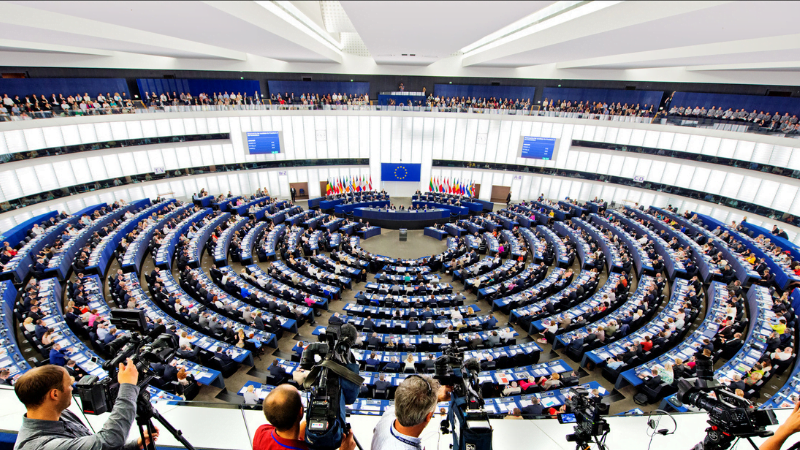The European Union’s Media Freedom Act (EMFA) was approved in the European Parliament on Wednesday with 464 votes in favour, 92 against, and 65 abstentions and will now move for final adoption as advocacy groups call on member states to implement it properly while raising concerns about spyware.
The legislation aims to regulate the media environment across the 27 European Union member states, upholding media freedom, pluralism and the protection of journalists. The law’s journey included a draft of the law by the commission, followed by a public consultation for journalists, media platforms, companies, NGOs and citizens.
In December, European Council and Parliament negotiators agreed on the final draft following tense discussions on its finer points, including the use of spyware against journalists.
The law was debated in the Parliament plenary on Tuesday and faced a vote on Wednesday.
Reporters Without Borders (RSF) reacted to the outcome, stating it welcomes the “major step forward for the right to information in Europe and calls on states to rise to the challenge with ambitious implementation.”
“From editorial independence to the regulation of media concentration, from state advertising to better protection for online content produced by news media, RSF’s proposals were heard and considered. They include recognition of JTI certification as a benchmark for identifying online news media. RSF welcomes this progress and calls on member states to implement these provisions ambitiously,” Julie Majerczak, the head of RSF’s Brussels office, said in a statement.
Parliament’s President Roberta Metsola said the law will safeguard journalists from interference, protect them from revealing sources, and ensure transparency of media ownership.
“It fights disinformation. For Daphne. For Ján. For all journalists threatened. For democracy,” she said in a recorded video statement.
During Tuesday’s debate, Maltese MEP David Casa appealed for a strong vote on the law, calling it a “strong tool in our arsenal able to put an end to practices that are hostile to journalists.”
“Democracy falters when journalists are threatened,” Casa said.
The MEP recalled pressure piled on local media, stating, “We will no longer accept that the public broadcaster acts as government propaganda, or that newspapers are subjected to a mountain of pressure lest they do their job of reporting what is in the public interest.”
The International Press Institute also welcomed the news, writing on X that the “EMFA must protect media pluralism and independence and stop media capture,” but they also addressed the elephant in the room, that of ending the use of spyware against journalists.
Spyware still an issue
Another MEP, Clare Daly, sent a communication before the vote, calling for lawmakers’ attention on clauses related to spyware.
“As it currently stands, the EMFA effectively legalises the use of spyware against journalists,” she wrote, continuing that the national security exemption remains but has just been reworded.“
“Quite apart from the extreme danger of this in and of itself, we cannot ignore the precedent that the EMFA’s spyware provisions will set. Legalising and legitimating the use of spyware against journalists ‘with safeguards’ and a national security exemption will mean that any future regulation of spyware at the EU level will inevitably permit its use against ordinary citizens with far fewer safeguards and far broader exemptions,” she wrote.
She continued that the law’s safeguards are “profoundly inadequate to protect against the threats posed by spyware to political speech and action, to investigative journalism, and to the public interest.”
Malta was one of a handful of European Union member states that lobbied to allow state surveillance of journalists under the law. Leaked minutes from a council meeting showed that Malta, Italy, France, Finland, Greece, Cyprus, and Sweden all insisted on retaining a paragraph with a caveat to a ban on spying on journalists, stating, “This article shall be without prejudice to the responsibility of Member States to protect national security.”
The Maltese government reacted furiously to the leak but stopped short of denying their stance.
The European Federation of Journalists (EFJ), representing over 320,000 journalists in Europe, strongly condemned the “illiberal and repressive request” and called for it to be rejected by the European Parliament and European Commission.
“We are deeply shocked by the demands of these seven governments, which are flouting European legal standards of press freedom, as established by the case law of the European Court of Human Rights,” said Maja Sever, EFJ President.
While a ‘compromise’ was eventually reached on the wording, not all MEPs are happy.
Other provisions
As per the EMFA, state funding to media will be allocated openly through a non-discriminatory procedure based on public criteria to various media.
The state will also have to publish information each year on how much they spend on media advertising, who it was paid to, and how much was spent per media service provider.
Furthermore, all heads and board members of public media must be appointed through a transparent and non-discriminatory process. It will also no longer be possible to dismiss senior staff before the end of their term unless they fail to meet performance criteria.
It also considers a number of safeguards against political interference in editorial decisions, better protection for sources, a possible European Board for Media Services, increased transparency of media ownership, and rules on how the state hands out advertising money.













